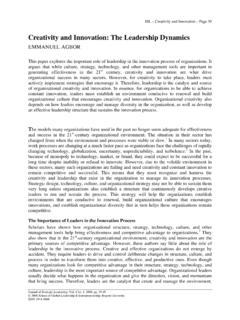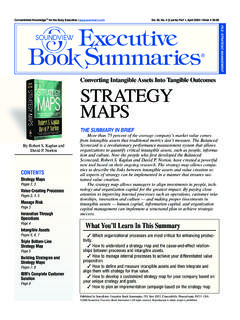Transcription of National Standards for Headteachers Northern Ireland …
1 National Standards for Headteachers Northern Ireland Edition National Standards for Headteachers ( Northern Ireland Edition) Date of Issue: August 2005 National Standards for Headteachers (NI Edition) 1 Contents Introduction 2 Shaping the Future 4 Leading Learning and Teaching 5 Developing Self and Working with Others 6 Managing the Organisation 7 Securing Accountability 8 Strengthening Community 9 National Standards for Headteachers (NI Edition) 2 Introduction to the National Standards for Headteachers This revision to the National Standards for Headteachers reflects the evolving role of headship in the early 21st century and incorporates current government thinking and guidance. The Standards recognise the key role that Headteachers play in raising and maintaining levels of attainment in schools in order to meet the needs of every child within the framework of government policy.
2 The Standards embody three key principles, namely that the work of Headteachers should be: learning-centred, focused on leadership and reflect the highest possible professional Standards . These principles have guided this development and underpin the core purpose and key areas of headship. The Core Purpose of the headteacher The core purpose of the headteacher is to provide professional leadership and management for a school. This will promote a secure foundation from which to achieve high Standards in all areas of the school s work. To gain this success a headteacher must establish high quality education by effectively managing teaching and learning and using personalised learning to realise the potential of all pupils. Headteachers must establish a culture that promotes excellence, equality and high expectations of all pupils. The headteacher is the leading professional in the school.
3 Accountable to the Board of Governors, the headteacher provides vision, leadership and direction for the school and ensures that it is managed and organised to meet its aims and targets. The headteacher , working with others, is responsible for evaluating the school s performance to identify the priorities for continuous improvement and raising Standards ; ensuring equality of opportunity for all; developing policies and practices; ensuring that resources are efficiently and effectively used to achieve the school s aims and objectives and for the day-to-day management, organisation and administration of the school. The headteacher , working with and through others, secures the commitment of the wider community to the school by developing and maintaining effective partnerships with, for example, schools, other services and the wider educational support services. Through such partnerships and other activities, Headteachers play a key role with others to raise Standards locally.
4 Drawing on the support provided by members of the school community, the headteacher is responsible for creating a productive learning environment which is engaging and fulfilling for all pupils. in contributing to the development of the education system as a whole and collaborating National Standards for Headteachers (NI Edition) 3 Using the Standards The National Standards for Headteachers are generic and are applicable to Headteachers irrespective of phase and type of school. They are intended to provide a framework for professional development and action and to inform, challenge and enthuse serving and aspiring Headteachers . The Standards , therefore, have a range of uses. The objectives of the Performance Review and Staff Development (PRSD) Scheme will be informed by the Standards . They will assist in the recruitment of Headteachers .
5 They provide guidance to all school stakeholders in what should be expected from the role of the headteacher and are also used to identify threshold levels of performance for the assessment framework within the Professional Qualification for Headship in Northern Ireland PQH (NI). The key areas The Standards are set out in six key non-hierarchical areas. These six key areas, when taken together, represent the role of the headteacher . Shaping the Future Leading Learning and Teaching Developing Self and Working with Others Managing the Organisation Securing Accountability Strengthening Community Within each of these key areas, the knowledge requirements, professional qualities (skills, dispositions and personal capabilities Headteachers bring to the role) and actions needed to achieve the core purpose are identified. Whilst particular knowledge and professional qualities are assigned to one of the six key areas, it is important to emphasise that they are interdependent and many are applicable to all key areas.
6 Headteachers will attach relative importance to the actions, and add others, as they define the strategic and operational priorities within their own diverse contexts. Effective Headteachers are responsive to the context of the school and maintain an overview that integrates their work into a coherent whole. National Standards for Headteachers (NI Edition) 4 Shaping the Future Critical to the role of headship is working with the Board of Governors and others to create a shared vision and strategic plan which inspires and motivates pupils, staff and all other members of the school community. This vision should express core educational values and moral purpose, be inclusive of stakeholders values and beliefs and be informed by the most innovative thinking and practice on schooling and learning. The strategic planning process is critical to sustaining school improvement and ensuring that the school moves forward for the benefit of its pupils.
7 Knowledge Knows about: Local, regional, National and global trends Ways to build, communicate and implement a shared vision Strategic planning processes Strategies for communication both within and beyond the school New technologies, their use and impact Leading change, creativity and innovation Professional Qualities Is committed to: A collaborative school vision of excellence and equity that sets high Standards for every pupil The setting and achieving of ambitious, challenging goals and targets The use of appropriate new technologies in enhancing learning within and beyond the school Inclusion and the ability and right of all to be the best they can be Is able to: Think strategically, build and communicate a coherent vision in a range of compelling ways Inspire, challenge, motivate and empower others to carry the vision forward Model the values and vision of the school Actions Ensures the vision for the school is clearly articulated, shared, understood and acted upon effectively by all Works within the school community to translate the vision into agreed objectives and operational plans which will promote and sustain school improvement Demonstrates the vision and values in everyday work and practice Motivates and works with others to create a shared culture and positive climate Ensures creativity, innovation and the use of appropriate new technologies to achieve excellence Ensures that strategic planning takes account of the diversity.
8 Values and experience of the school and community at large National Standards for Headteachers (NI Edition) 5 Leading Learning & Teaching Headteachers have a central responsibility for raising the quality of learning and teaching and for pupils achievement. This implies setting high expectations and monitoring and evaluating the effectiveness of learning outcomes. A successful learning culture will enable pupils to become effective, enthusiastic, independent learners, committed to life-long learning. Knowledge Knows about: Strategies for raising achievement and achieving excellence The development of a personalised learning culture within the school Models of learning and teaching The use of new and emerging technologies to support teaching and learning (within and beyond the school) Principles of effective teaching and assessment for learning Models of behaviour and attendance management Strategies for ensuring inclusion, diversity and access Curriculum design and management Tools for data collection and analysis Using ETI inspection and research evidence to inform teaching and learning Monitoring and evaluating performance School self evaluation Strategies for developing effective teachers Professional Qualities Is committed to.
9 The raising of Standards for all in the pursuit of excellence The continuing learning of all members of the school community The entitlement of all pupils to effective teaching and learning Choice and flexibility in learning to meet the personalised learning needs of every child Is able to: Demonstrate personal enthusiasm for and commitment to the learning process Demonstrate the principles and practice of effective teaching and learning Access, analyse and interpret information Initiate and support research and debate about effective learning and teaching and develop relevant strategies for performance improvement Acknowledge excellence and challenge poor performance across the school Promotes, facilitates and manages the school s capacity to develop and deliver appropriate curricular experience for all of its pupils Actions Ensures a consistent and continuous school-wide focus on pupils achievement, using data and benchmarks to monitor progress in every child s learning Ensures that learning is at the centre of strategic planning and resource management Establishes creative.
10 Responsive and effective approaches to learning and teaching Ensures a culture and ethos of challenge and support where all pupils can achieve success and become engaged in their own learning Demonstrates and articulates high expectations and sets challenging targets for the whole school community Implements strategies which secure high Standards of behaviour and attendance Determines, organises and implements a diverse, flexible curriculum and implements an effective assessment framework Takes a strategic role in the development of new and emerging technologies to enhance and extend the learning experience of pupils Monitors, evaluates and reviews classroom practice and promotes improvement strategies Challenges underperformance at all levels and ensures effective corrective action and follow-up National Standards for Headteachers (NI Edition) 6 Developing Self and Working with Others Effective relationships and communication are important in headship as Headteachers work with and through others.










